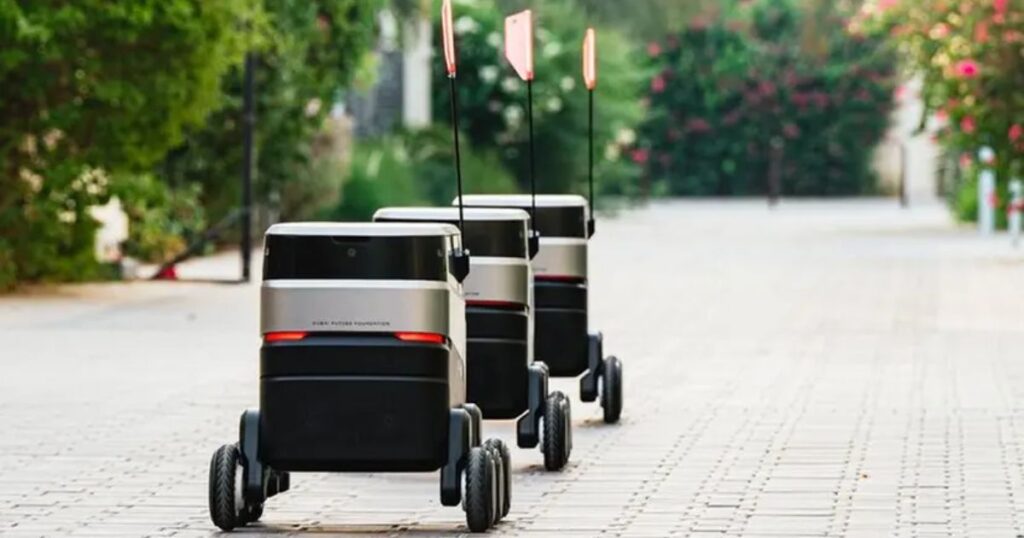In a significant move to revolutionize Dubai’s housing landscape and drive smart city development, the Dubai Future Foundation (DFF) and Mohammed Bin Rashid Housing Establishment (MBRHE) have entered a strategic partnership. This collaboration, sealed with a Memorandum of Understanding (MoU), aims to leverage innovation and research to develop cutting-edge, sustainable housing solutions. Complementing this initiative, The Sustainable City in Dubai, in collaboration with Dubai Future Labs and Lyve Global, has launched an innovative pilot project featuring autonomous delivery robots.
Strategic Partnership
The partnership marries DFF’s innovative approach with MBRHE’s sector-specific knowledge to pioneer sustainable housing initiatives. The collaboration introduces two pivotal initiatives: a comprehensive research project and a dynamic cohort program. The research project aims to establish a standardized framework for sustainable housing development proposals, setting a new global standard for urban housing research and development.
The cohort program will utilize DFF’s innovation ecosystem, AREA 2071, to launch joint initiatives and brainstorm housing innovations. Startups and tech companies will develop and test revolutionary housing solutions in real time, with successful pilots fast-tracked for implementation across Dubai. This initiative is crucial for achieving Dubai’s vision of becoming the world’s leading smart city by 2030.
Remarks From Stakeholders
His Excellency Omar Hamad Bushahab, Executive Director at MBRHE, expressed pride in the partnership, stating, “This collaboration combines our extensive expertise in the housing industry with the foresight strategies of the Dubai Future Foundation. It is poised to drive significant advancements in Dubai’s housing sector by fostering research and pioneering solutions aimed at enhancing the quality of life for our community and delivering cutting-edge, sustainable housing solutions.”
His Excellency Khalfan Juma Belhoul, CEO of DFF, emphasized the transformative nature of the partnership, stating, “By combining our strengths, we are uniquely positioned to anticipate future opportunities, transforming them into tangible impact-driven initiatives, thereby setting a new benchmark for the housing sector. This partnership extends beyond improving housing; it’s about creating sustainable solutions that drive progress and ensure a prosperous future for Dubai and UAE’s society.”
The partnership seeks to implement actionable solutions to drive the sustainable development of Dubai’s housing ecosystem, fundamentally elevating the sector through technology and innovation.
Innovative Pilot Projects for a Smarter Dubai
In a related initiative, The Sustainable City in Dubai, the first fully sustainable community in the region, has launched a delivery robot pilot in collaboration with Dubai Future Labs and Lyve Global. Starting this month, three autonomous on-demand delivery robots developed by Dubai Future Labs will begin their trial within The Sustainable City community. These robots will provide autonomous delivery services to residents from all restaurants and shops within the plaza area, utilizing a smart interface powered by Lyve Global.
The Sustainable City’s design, which is fully pedestrianized and car-free within residential clusters, makes it ideal for adopting autonomous solutions. The pilot aims to enhance safety, cleanliness, and cost-efficiency while reducing traffic, carbon emissions, and waiting times.
Khalifa Al Qama, Director of Dubai Future Labs, highlighted the project’s significance, stating, “These innovative robots have been specifically designed to ensure swift delivery of products within a remarkable timeframe of just under 30 minutes while being fully equipped to navigate their surroundings safely and efficiently, with the capability to identify charging stations, eliminating the requirement for human intervention.”
Dubai Robotics and Automation Program
This initiative aligns with the objectives of the “Dubai Robotics and Automation Program,” launched by His Highness Sheikh Hamdan bin Mohammed bin Rashid Al Maktoum, Crown Prince of Dubai. Fadi Alfaris, GM of NZE Solutions at SEE Holding, emphasized the synergy between sustainable communities and advanced technologies, stating, “The Sustainable City in Dubai tests the applicability of various ideas and integrated solutions. It is an ideal location for piloting autonomous delivery robots and their future deployment.”
Hassan Hallas, CEO of Lyve Global, expressed enthusiasm for the collaboration, stating, “This initiative underscores our commitment to innovation and sustainability. Together, we are paving the way for a smarter, more connected future in the world of logistics.”
Dubai Future Labs
Developed locally by a team of roboticists and engineers from Dubai Future Labs, these delivery robots boast advanced features, including a Fleet Management System with real-time tracking, a backend order fulfillment and delivery operations system by Lyve Global, and a Secured Delivery Compartment accessible only by the customer.
These autonomous delivery robots promise rapid delivery within 30 minutes. They navigate sidewalks safely and independently while locating charging stations as needed, eliminating human intervention.
This initiative contributes to Dubai’s mission to make 25% of trips autonomous by 2030 and supports the vision of positioning Dubai as the smartest city in the world.
Original Story at www.environmentenergyleader.com
